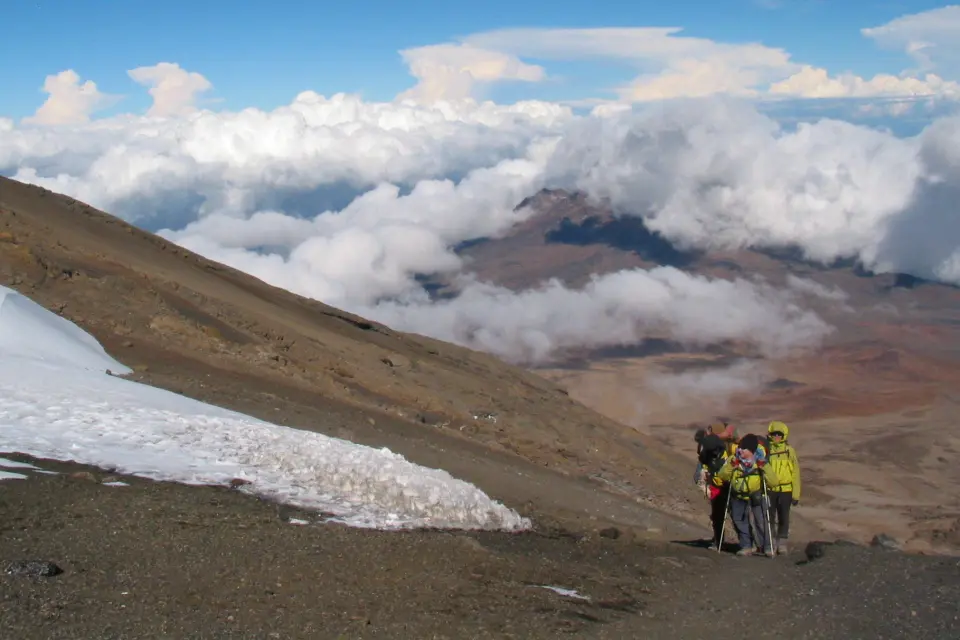CLIMBING KILIMANJARO: 29 TIPS FOR A JOURNEY OF MIND AND BODY
Kilimanjaro, the majestic rooftop of Africa, stands tall and proud, beckoning adventurers from across the globe to embark on a life-changing expedition. At 19,341 feet, this dormant volcano is the tallest freestanding mountain in the world and offers an awe-inspiring challenge for those seeking to test their physical and mental limits. But before you don your hiking boots and head to Tanzania, it’s essential to prepare meticulously. In this article, we’ll delve into the art of preparing mentally and physically for a Kilimanjaro climb.
The Mental Challenge
Embarking on a Kilimanjaro climb is not merely a physical endeavor; it’s a mental odyssey as well. The journey to the summit is fraught with uncertainties, unpredictable weather, and physical exhaustion. To conquer Kilimanjaro, you must first conquer your own mind.
Set Clear Goals
Before you even step foot on the mountain, set clear and achievable goals. Whether it’s reaching the summit, savoring the breathtaking vistas, or simply challenging yourself, having well-defined objectives will give your climb a purpose. When the going gets tough, these goals will provide the mental fuel needed to press on.
Mental Toughness Training
Preparing your mind for Kilimanjaro involves developing mental resilience. Engage in activities like meditation, visualization, and mindfulness to enhance focus and concentration. These practices will serve as your mental armor when facing the demanding conditions on the mountain.
Know the Challenges
Understanding the challenges that lie ahead is vital. Kilimanjaro’s weather can be harsh, and altitude sickness is a real concern. Familiarize yourself with the symptoms and potential risks of altitude sickness, so you can recognize them early and take appropriate action, like telling your guide. If you’re climbing with a reputable company with trained guides, they’ll provide the necessary guidance. Being prepared for adversity will boost your confidence and determination.
Positive Self-Talk
Your inner dialogue can make or break your Kilimanjaro experience. Replace self-doubt and negativity with positive affirmations. Remind yourself of your past achievements and capabilities. Embrace a “can and wil-do” attitude, and you’ll find the strength to overcome even the most daunting obstacles.
Physical Preparation
With your mental game in check, it’s time to focus on physical conditioning. Kilimanjaro’s high-altitude terrain demands strength, endurance, and flexibility. Here’s how to get your body in peak condition.
Cardiovascular Fitness
Start by building cardiovascular endurance. Regular aerobic exercises such as running, cycling, and swimming will improve your lung capacity and stamina. Aim for at least 30 minutes of moderate-intensity cardio workouts, five days a week.
Strength Training
Incorporate strength training into your routine to enhance your muscular endurance and power. Focus on your legs, core, and upper body. Squats, lunges, planks, and push-ups are excellent exercises to include. Strength training will help you carry your gear and navigate the steep inclines of Kilimanjaro.
Hiking Practice
Simulate the conditions of Kilimanjaro by hiking on local trails or steep terrain. Gradually increase the duration and elevation gain of your hikes to mimic the challenges you’ll face on the mountain. This will also help you break in your hiking boots and adjust to carrying a backpack.
Flexibility and Balance
Don’t neglect flexibility and balance. Yoga and stretching exercises will improve your range of motion and help prevent injuries. Balance exercises like single-leg squats and lunges are essential for stability on uneven terrain.
Altitude Training
To acclimate your body to high altitudes, consider spending time at higher elevations within two weeks of your Kilimanjaro climb. This way you’ll maintain some acclimatization for Kilimanjaro. This could include hiking at local mountains or using altitude simulators. Altitude training will help your body adapt to the reduced oxygen levels you’ll encounter on the mountain.
Nutrition and Hydration
Proper nutrition and hydration are fundamental to your success on Kilimanjaro. Your body needs the right fuel to perform at its best. If you’ve chosen to climb with a top climbing company, they will provide you with a well-designed menu to fuel you on your climb. See how Tusker Trail uses the Culinary Institute of America to train their Kilimanjaro chefs.
Balanced Diet
Your climbing company should provide you with balanced diet rich in carbohydrates, proteins, and healthy fats. Carbohydrates provide the energy needed for strenuous hikes, while proteins aid in muscle recovery and repair. Don’t forget to include plenty of fruits and vegetables for essential vitamins and minerals.
Hydration
Staying hydrated is crucial, especially at high altitudes where dehydration can sap your energy. Drink plenty of water throughout the day, and consider adding electrolyte tablets to your water to replenish lost minerals through sweat and deep breathing.
Snacks While Climbing
Consider portable, high-energy snacks like nuts, granola bars, and dried fruits. On the mountain, your appetite may decrease, so having easily digestible snacks readily available is essential to keep your energy levels up.
Gear and Equipment
Having the right gear is paramount to your safety and comfort on Kilimanjaro. Invest in quality equipment and take the time to familiarize yourself with it before the climb – especially your boots.
Clothing
Dress in layers to accommodate changing weather conditions. You should be putting on and taking off layers regularly throughout your climbing day. Moisture-wicking base layers, insulating mid-layers, and waterproof outer layers are essential. Don’t forget a warm hat, gloves, and thermal socks to protect against the cold.
Footwear
Select comfortable and well-fitting hiking boots with excellent ankle support. Ensure they are broken in before your climb to avoid blisters and discomfort on the mountain. Your boots should be your best friends on the climb.
Backpack
A well-fitted backpack is crucial for carrying your essentials. Make sure it has padded shoulder straps and a waist belt for even weight distribution. Pack only the essentials to keep your load manageable.
Sleeping Gear
Choose a lightweight, insulated sleeping bag rated for the temperatures you’ll encounter on the mountain. A compact sleeping pad will provide insulation and comfort during cold nights.
Trekking Poles
Trekking poles can provide stability and reduce the strain on your legs and knees. They are especially useful during steep descents and long hikes.
Training Hikes and Acclimatization
In the months leading up to your Kilimanjaro climb, embark on training hikes and acclimatization treks. These experiences will not only improve your fitness but also help you get accustomed to hiking at higher altitudes.
Local Trails
Explore local hiking trails to build endurance and strength. Gradually increase the difficulty of your hikes to match the challenges of Kilimanjaro.
High-Altitude Treks
Consider going on high-altitude treks or backpacking trips to get a feel for the thin air and lower oxygen levels you’ll encounter on Kilimanjaro. These trips will help your body acclimate to the altitude.
Weekend Backpacking
Practice carrying a loaded backpack on weekend trips. This will help you become comfortable with your gear and the physical demands of hiking with a pack.
Mental Resilience on the Trail
As you set foot on Kilimanjaro’s trails, your mental preparedness will be put to the test. Here are some tips to maintain your mental resilience during the climb.
Stay Positive
Maintain a positive attitude throughout the journey. Focus on your goals, and remind yourself of your achievements and capabilities. Embrace the beauty of the mountain and the camaraderie of your fellow climbers.
Stay Hydrated and Nourished
Dehydration and malnutrition can impair your cognitive function. Ensure you drink enough water and eat regular, balanced meals and snacks to keep your mind sharp.
Climb with a Reputable Climbing Company
By choosing a top climbing company with professional guides who are medically trained, your safety and well-being take center stage, ensuring an adventure filled with excitement and peace of mind.
Learn how the top-ranked Kilimanjaro climbing company does it.



